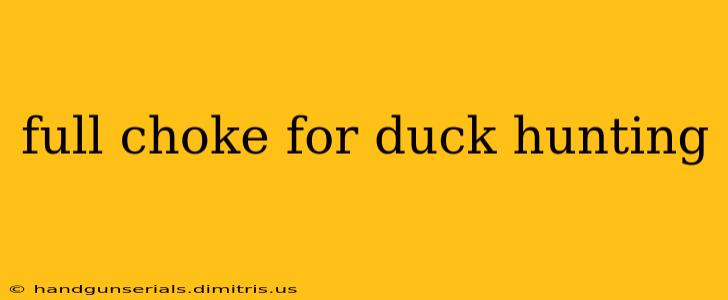Duck hunting presents unique challenges, demanding precision and powerful shot patterns to bring down fast-flying waterfowl at considerable distances. Choosing the right choke tube is crucial for success, and the full choke is a popular, albeit controversial, option. This article explores the pros and cons of using a full choke for duck hunting, helping you determine if it's the right choice for your hunting style and conditions.
Understanding Choke Tubes and Their Impact
Before diving into the specifics of full chokes, let's briefly review choke tubes and their function. A choke tube constricts the diameter of the barrel at the muzzle, influencing the shot pattern. This constriction affects the shot's spread, density, and effective range. Different chokes offer varying degrees of constriction:
- Extra Full: Tightest constriction, producing the most concentrated pattern, ideal for extremely long-range shots.
- Full: A very tight constriction, offering a dense pattern suitable for longer distances.
- Modified: A good all-around choke, providing a balance between pattern density and range.
- Improved Cylinder: Least constriction, offering a wide, open pattern best suited for close-range shots.
- Skeet/Cylinder: Widest pattern, ideal for very close-range shots.
The Full Choke: Pros and Cons for Duck Hunting
The full choke delivers a tight pattern, maximizing shot density at longer ranges. This is beneficial when targeting ducks at significant distances, offering a higher chance of a clean kill. However, the advantages come with significant trade-offs:
Pros:
- Extended Range: The tight pattern maintains its effectiveness at longer ranges than more open chokes, crucial for reaching distant ducks.
- Increased Pellet Density: The concentrated pattern increases the chances of hitting multiple pellets in the vital area of the duck, resulting in a quicker, cleaner kill.
- Superior Performance with Steel Shot: Steel shot, now the standard for many waterfowl hunters due to its non-toxic properties, generally performs better with tighter chokes like full due to its harder nature.
Cons:
- Reduced Pattern Area: The extremely tight pattern covers a smaller area. Missing the target by even a small amount means significantly fewer pellets hitting the duck, leading to missed or wounded birds. This is especially problematic for fast-moving targets like ducks.
- Increased Risk of Crippling: While a dense pattern increases the likelihood of a clean kill if you hit the bird, it increases the risk of injuring the bird without killing it if you slightly miss. A wounded duck is more likely to escape and suffer unnecessarily.
- Sensitivity to Shell Variations: Slight variations in ammunition, like different powder charges or pellet sizes, can significantly impact the pattern density and effectiveness of a full choke. Consistency in your ammunition choice is paramount.
- Not Ideal for All Hunting Situations: A full choke is not suitable for close-range shots or hunting in dense cover, where a wider pattern is advantageous.
Choosing the Right Choke: A Holistic Approach
The decision of whether or not to use a full choke for duck hunting depends heavily on your hunting style, typical hunting conditions, and shooting skills. Consider these factors:
- Shooting Distance: Are you consistently shooting at long ranges, or are your shots typically closer?
- Hunting Environment: Are you hunting in open water, or are there obstacles and dense cover?
- Your Shooting Skills: Are you a skilled marksman confident in your ability to consistently hit your target at longer distances?
Often, a modified choke offers a better compromise for many duck hunters. It delivers a balance between range and pattern density, reducing the risk of crippling birds while still offering sufficient power at moderate distances.
Conclusion: Informed Decision Making is Key
The full choke offers advantages for long-range shots in open areas, especially when using steel shot. However, its narrow pattern and sensitivity to variables increase the risk of wounded birds and missed opportunities. Careful consideration of your hunting style, shooting skills, and environmental factors is essential in selecting the appropriate choke tube to ensure ethical and successful duck hunting. Experiment with different chokes to discover what best suits your needs and always prioritize responsible hunting practices.

